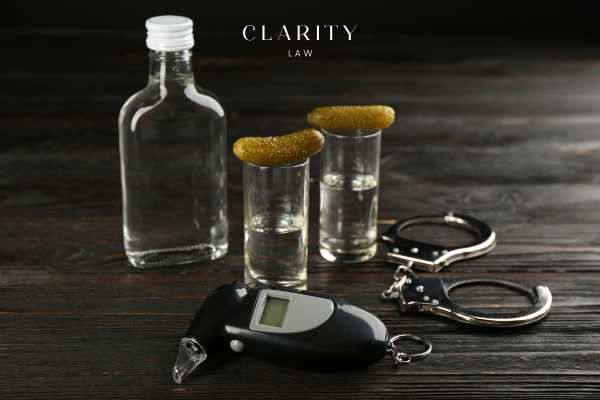If you’ve been arrested for a first-time DUI in Michigan, you may be feeling confused and unsure of what happens next. A Michigan DUI, or drunk driving charge, is a serious offense that can lead to long-term consequences, even for a first-time offender. Understanding the laws, penalties, and legal process can help you manage the situation and protect your rights. In this article, we’ll cover what constitutes a DUI in Michigan, the possible negative consequences, and what you can do to minimize the impact on your life.
If you or a loved one is dealing with a first-time DUI charge, it's essential to seek knowledgeable legal guidance. Our experienced DUI defense attorneys in Dearborn are here to help you explore your options and build a strong defense. Contact Clarity Law today at (313) 513-1919 to discuss your case and take the first step toward protecting your future.
What Constitutes a DUI in Michigan?
In Michigan, a DUI (Driving Under the Influence) refers to operating a vehicle while impaired by alcohol, drugs, or a combination of both. It is also commonly known as Operating While Intoxicated (OWI) in Michigan law, but the two terms are often used interchangeably. Additionally, Michigan law covers Impaired Driving, which means driving when your abilities are affected but your blood alcohol concentration (BAC) is below the legal limit.
What Is Considered a DUI in Michigan?
A DUI in Michigan means that you are driving or in control of a vehicle while your ability to operate it safely is impaired by alcohol or drugs. This can include anything from alcohol consumption to prescription medication or illegal drugs. Police officers determine impairment through observation, field sobriety tests, and blood alcohol concentration testing. A drunk driving charge can be made even if your BAC is below 0.08%, depending on the circumstances.
Blood Alcohol Content (BAC) Thresholds
In Michigan, the legal limit for BAC is:
- 0.08% for drivers aged 21 and older.
- 0.02% for drivers under the age of 21.
- 0.04% for commercial drivers.

If your BAC is at or above these levels, you can be charged with a DUI or OWI, even if you feel sober enough to drive. Michigan also has a Super Drunk law, which applies if your BAC is 0.17% or higher, leading to even harsher penalties.
Definition of “Operating While Intoxicated” (OWI)
Operating While Intoxicated (OWI) means operating a vehicle while your ability to do so is significantly impaired by alcohol or drugs. This includes situations where your BAC is 0.08% or higher, or when you’re visibly impaired due to the influence of alcohol or drugs. OWI is a serious offense in Michigan, with penalties including jail time, fines, and license suspension.
Differences Between DUI, OWI, and Operating While Visibly Impaired (OWVI)
While DUI and OWI refer to driving with a BAC of 0.08% or higher, Operating While Visibly Impaired (OWVI) refers to driving when it’s obvious that your ability is impaired, even if your BAC is below 0.08%. OWVI is a lesser charge compared to OWI, but it still carries significant consequences, such as fines and days in jail.
Penalties for a First-Time DUI in Michigan
Even for first-offense DUI charges in Michigan, the penalties can be severe. Michigan takes drunk driving seriously, and even a single offense can lead to financial, legal, and personal repercussions. Whether you're charged with DUI, OWI, or Impaired Driving, the consequences can affect various areas of your daily life.
What Are the Consequences of a First-Time DUI?
A first-time DUI conviction can result in:
- Fines: You may be required to pay fines ranging from $100 to $500.
- Jail Time: While rare for first offenses, you could face up to 93 days in jail for a 1st offense.
- Probation: Many first-time DUI offenders are placed on probation, which may require you to meet regularly with a probation officer, avoid alcohol, and follow certain court-imposed restrictions.
- License Suspension: For a first-time DUI, your license will typically be suspended for 30 days, during which you are not allowed to drive. After this, you may be eligible for restricted driving privileges for an additional 150 days, allowing you to drive under specific conditions.
License Suspension and Possible Reinstatement Requirements
A first-time drunk driving offense in Michigan typically results in a license suspension period of 30 days, meaning you cannot drive during that period. After the suspension, there may be an additional 150 days where you can only drive with restricted privileges, such as going to work or school. To have your driver license reinstated, you may need to meet court requirements, pay fees, and complete alcohol counseling.
Alcohol and Drug Education Programs and Community Service
As part of your sentencing, you may be required to complete an alcohol education program or perform hours of community service. These programs are designed to educate offenders about the risks of drunk driving and help prevent repeat offenses. Fulfilling these requirements may also help you avoid harsher penalties, such as extended jail time or additional license suspensions.
Impact on Driving Record and Insurance Rates
A first-time DUI will go on your driving record, where it will remain for several years. Having a DUI on your record will likely result in significantly higher insurance premiums, as insurance companies view DUI offenders as high-risk drivers. In some cases, you may even have trouble finding an insurance provider willing to cover you after a drunk driving conviction.
Legal Process After a First-Time DUI Arrest
If you are arrested for a first-time DUI, it’s important to understand the legal process that follows. Being aware of each step can help you prepare and make informed decisions about your legal defense.
After your arrest, you will be processed and given a court date. You may have to post bail to be released, and your car may be impounded depending on the circumstances of your drunk driving charge. You will also be issued a restricted license since your regular license will be confiscated by the arresting officer.

The criminal arrest process for a DUI typically includes a traffic stop, field sobriety tests, and chemical testing (such as a breathalyzer or blood test). If the officer determines that you are impaired, you will be taken into custody. Your first court appearance will happen shortly after your arrest, where you will be informed of the charges against you.
Court Hearings, Arraignment, and Trial Process
At your first court hearing, known as an arraignment, you will be formally charged and asked to enter a plea. Depending on the circumstances of your drunk driving charge, the case may go to trial if you plead not guilty. During this process, your drunk driving defense lawyer can work to challenge the evidence, negotiate plea deals, or fight for reduced penalties.
Plea Options (Guilty, Not Guilty, No Contest)
When facing a first-time DUI, you will need to decide how to plead. Pleading guilty means admitting to the charge, while not guilty means challenging the case in court. Pleading no contest means you do not admit guilt but agree to accept the penalties. Each plea option comes with different consequences, so it’s important to discuss the best option with your Dearborn criminal defense lawyer.
Possible Defenses for a First-Time DUI
Facing a first-time DUI charge does not mean you are automatically guilty. There are several potential defenses that can be used to fight the charges and avoid conviction.
Some of the most common defenses in DUI cases include:
- Challenging the Validity of Field Sobriety Tests: Field sobriety tests can be inaccurate, as factors like nerves, medical conditions, or poor road conditions may cause someone to fail even if they are not impaired.
- Questioning the Accuracy of Breathalyzer or Blood Tests: Breathalyzer machines can malfunction, and blood tests can be mishandled, leading to incorrect results. Experienced attorneys can challenge these tests if there are doubts about their reliability.
- Arguing Procedural Errors by Law Enforcement: If the police made procedural mistakes during your arrest, such as failing to read you your rights, your charges may be reduced or dismissed.
How to Minimize the Impact of a First-Time DUI
One of the most effective ways to minimize the impact of a DUI is by negotiating reduced charges. For example, your attorney may be able to negotiate a plea deal to reduce the charge from OWI to Impaired Driving, which carries lighter penalties. This can help you avoid harsher punishments like extended jail time or longer license suspensions.
- Negotiating Reduced Charges or Penalties: Your criminal defense attorney may work to negotiate a plea deal that reduces the charge from DUI to a lesser offense like Operating While Visibly Impaired (OWVI), which carries fewer penalties. By pleading to a lesser charge, you may avoid significant days in jail, large fines, and lengthy probation periods.
- Completing Court-Ordered Programs: Completing court-ordered programs, such as alcohol education classes or community service, can help demonstrate your commitment to rehabilitation. Judges may consider this when determining your final penalties, potentially reducing your overall sentence.
- Applying for Restricted Driving Privileges: If your license is suspended, you may be eligible to apply for restricted driving privileges after serving part of the suspension. This allows you to drive to essential locations, such as work or school, while you wait for full reinstatement of your driving rights.
Don’t Navigate a DUI Alone—Get Help From Clarity Law
Facing a first-time DUI charge in Michigan can be stressful, but understanding the process and your options can make a big difference. A drunk driving conviction can impact your life in many ways, from license suspensions to fines and time in jail, but with the right defense, you may be able to reduce the penalties. If you’re dealing with a first-time DUI, contact Clarity Law in Dearborn, Michigan, to get the legal guidance you need to protect your rights and future.
Navigating the aftermath of a first-time DUI charge in Michigan can be overwhelming, but you don't have to face it alone. The legal consequences can be serious, but with the right support, you can better understand your options and work toward a favorable outcome.
If you or someone you know is dealing with a first-time DUI charge, don’t wait to seek help. Our dedicated team is here to guide you through the process and advocate for your rights. Contact us today for a consultation and let us help you protect your future.
